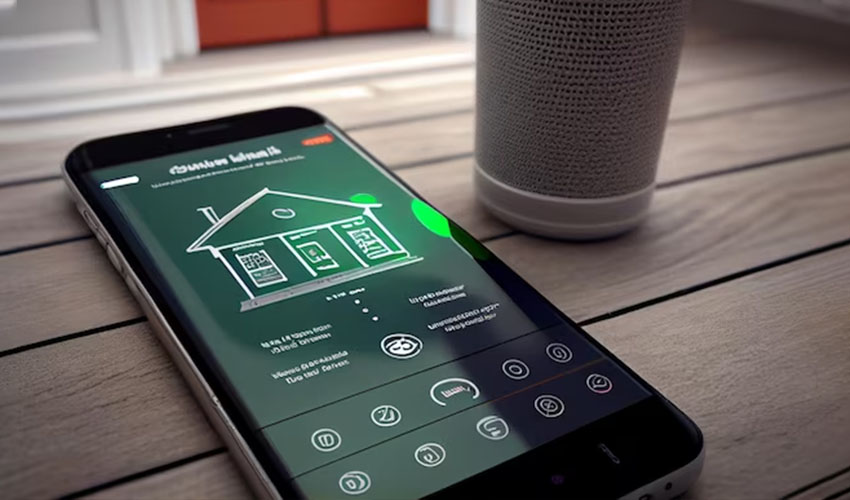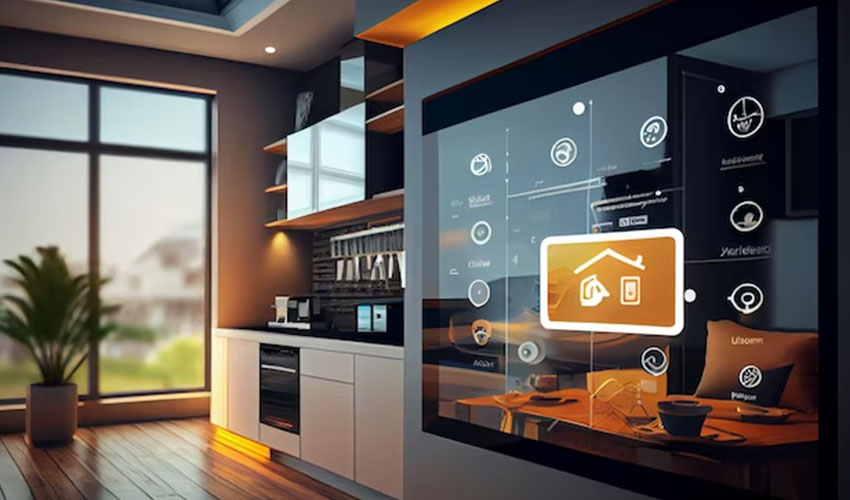Table of Contents
Introduction
What is a smart home control app?
In essence, a smart home control app is a digital interface that allows users to manage and monitor different functions within their homes through a mobile device or voice commands. These apps leverage advanced technologies to create a seamless and efficient living experience.
The rising trend of smart homes
The increasing adoption of smart home control apps is part of a broader trend toward creating smart homes. These homes are equipped with connected devices that communicate with each other, offering users a level of convenience and automation that was once unimaginable.
Benefits of Smart Home Control Apps
Convenience and comfort
One of the primary advantages of smart home control apps is the unparalleled convenience they provide. Users can remotely control various devices, such as thermostats, lights, and security systems, creating a personalized and comfortable living environment.
Energy efficiency
Smart home control apps contribute to energy efficiency by allowing users to monitor and regulate their energy consumption. Automated systems can adjust lighting and heating based on occupancy, reducing unnecessary energy usage.
Enhanced security
Security features embedded in these apps enable users to monitor their homes in real-time. From surveillance cameras to smart locks, homeowners can ensure the safety of their property even when they are away.
Integration with other devices
Smart home control apps excel in their ability to integrate with a wide range of devices. Whether it’s syncing with smart refrigerators or connecting with wearable devices, these apps offer a comprehensive and interconnected user experience.
Key Features in Smart Home Control App Development
Remote access and control
The cornerstone of any smart home control app is its ability to provide users with remote access and control. This feature enables users to manage their homes from anywhere, enhancing the flexibility and convenience of modern living.
Voice command integration
With the advent of voice recognition technology, smart home control apps now allow users to control devices through voice commands. This hands-free approach adds an extra layer of accessibility and ease of use.
Security protocols
To address concerns about data security, developers incorporate robust security protocols into smart home control apps. Encryption and authentication measures ensure that user data remains confidential and protected.
Compatibility with various devices
In a world where multiple smart devices coexist, compatibility is key. Successful smart home control apps are designed to work seamlessly with a variety of devices, providing users with a unified and cohesive smart home experience.
Challenges in Smart Home Control App Development
Interoperability issues
One of the challenges in developing smart home control apps is ensuring interoperability among different devices and platforms. Achieving a harmonious integration can be complex due to varying technical standards.
Security concerns
As smart homes become more prevalent, so do concerns about cybersecurity. Developers must stay vigilant against potential vulnerabilities and continuously update their apps to protect users from evolving threats.
User adoption challenges
Despite the benefits, some users may be hesitant to adopt smart home control apps due to concerns about complexity or privacy. Developers need to focus on creating user-friendly interfaces and addressing potential user reservations.
The Role of Artificial Intelligence (AI)
AI-driven automation
Artificial Intelligence plays a pivotal role in enhancing the automation capabilities of smart home control apps. Through machine learning algorithms, these apps can learn user preferences and automate routine tasks.
Machine learning for predictive behavior
Smart home control apps leverage machine learning to analyze user behavior patterns. This enables the app to predict user preferences, making adjustments to the home environment without explicit commands.
Personalization in user experience
AI enables a personalized user experience by tailoring recommendations and settings based on individual habits. This level of personalization contributes to a more enjoyable and efficient living experience.
Recent Technological Advancements
Internet of Things (IoT) integration
The integration of IoT in smart home control apps expands their capabilities. Users can connect and control a myriad of devices, creating a fully interconnected ecosystem within their homes.
5G technology
The rollout of 5G technology further enhances the performance of smart home control apps. Faster and more reliable connectivity ensures seamless communication between devices, reducing latency and improving overall user experience.
Augmented Reality (AR) applications
Innovative developers are exploring AR applications in smart home control. This immersive technology can provide users with visual overlays, making it easier to interact with and control their smart devices.
Considerations for Developers
User-friendly interface
Developers must prioritize a user-friendly interface to ensure broad adoption. Intuitive design and straightforward navigation contribute to a positive user experience.
Scalability and future-proofing
As technology evolves, smart home control apps must be scalable and adaptable. Future-proofing ensures that the app remains relevant and functional as new devices and technologies emerge.
Regular updates and support
Continuous improvement through regular updates is crucial. Developers should provide ongoing support to address issues, introduce new features, and stay ahead of security threats.
Case Studies: Successful Smart Home Control Apps
Amazon Alexa
Amazon Alexa stands as a prime example of a successful smart home control app. Its voice recognition capabilities and vast compatibility with other devices have made it a staple in many households.
Google Home
Google Home offers seamless integration with Google’s ecosystem and a wide range of compatible devices. Its intuitive interface and voice command features contribute to its popularity.
Apple HomeKit
Apple HomeKit’s focus on security and privacy has earned it a dedicated user base. The app’s integration with Siri and Apple’s ecosystem provides a cohesive and secure smart home experience.
Future Trends in Smart Home Control App Development
Integration with smart cities
The future of smart home control apps involves integration with broader smart city initiatives. This includes collaboration with public services and infrastructure to create more connected and efficient urban living.
Enhanced energy management
With a growing focus on sustainability, future smart home control apps will likely emphasize advanced energy management features. This includes optimizing energy usage based on renewable energy sources and user preferences.
Increased focus on sustainability
Sustainability will play a crucial role in the evolution of smart home control apps. From eco-friendly design practices to energy-efficient algorithms, developers will prioritize solutions that contribute to a greener future.
User Experience and Design Principles
Intuitive navigation
User experience is paramount in smart home control apps. Intuitive navigation ensures that users can easily access and control various devices without unnecessary complexity.
Visual appeal
A visually appealing interface enhances user engagement. Developers should prioritize a clean and visually pleasing design to create a positive and enjoyable user experience.
User feedback and updates
Incorporating user feedback is essential for continuous improvement. Regular updates based on user suggestions and evolving technologies contribute to the longevity and success of smart home control apps.
The Impact of Smart Home Control Apps on Daily Life
Time-saving benefits
Smart home control apps save users time by automating routine tasks. From adjusting the thermostat to setting up personalized lighting, these apps streamline daily activities.
Customization for individual preferences
The ability to customize and personalize the home environment is a key benefit. Smart home control apps empower users to create living spaces tailored to their individual preferences.
Improved home security
Enhanced security features provide homeowners with peace of mind. Real-time monitoring and alerts ensure that users can respond promptly to any potential security concerns.
Security Measures in Smart Home Control Apps
Encryption protocols
To safeguard user data, encryption protocols are implemented. These protocols ensure that communication between devices and the app remains secure and protected from external threats.
Multi-factor authentication
An added layer of security is achieved through multi-factor authentication. This feature helps prevent unauthorized access to the smart home control app and its connected devices.
Regular security audits
Developers should conduct regular security audits to identify and address potential vulnerabilities. This proactive approach ensures that the app remains resilient against evolving cybersecurity threats.
Cost Considerations in App Development
Initial development costs
Developing a smart home control app requires a significant investment in technology and talent. Initial development costs include design, programming, and testing phases.
Maintenance and updates
Ongoing maintenance and updates are essential to keep the app functioning optimally. Developers must allocate resources for regular updates, bug fixes, and improvements to stay competitive in the market.
Choosing the Right Development Team
Expertise in IoT and AI
A proficient development team should have expertise in IoT and AI technologies. This ensures that the smart home control app is equipped with the latest advancements in these fields.
Track record and reviews
Choosing a development team with a proven track record is crucial. Reviews and testimonials from previous clients provide insights into the team’s capabilities and reliability.
Transparent communication
Effective communication between developers and clients is vital throughout the development process. Transparent communication ensures that the app aligns with the client’s vision and requirements.
Conclusion
In conclusion, smart home control app development represents a transformative force in modern living. As technology continues to advance, these apps will play an increasingly integral role in shaping the way we interact with our homes. From enhanced convenience to improved security and sustainability, the benefits are undeniable.
Thanks for reading our post “Smart Home Control App Development: Revolutionizing the Way We Live”. Please connect with us to know more about Smart Home Control App Development.
















